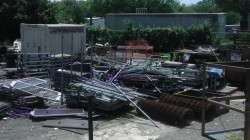How To Reduce Cart Theft

At the end of the growing season, greenhouses are empty. Benches are bare. The huge stacks of empty containers waiting to be filled have dwindled down to just a few. Growers are usually relieved to find most of their inventory gone. But anxiety can build about the thousands of shipping carts that growers lose in a single season because of theft.
Most theft occurs when carts left at retail during the selling season simply disappear. With the higher prices recyclers pay for scrap metals, metal rolling carts have become easy pickings for thieves who want quick cash.
Growers, cart rental companies and cart manufacturers have implemented some programs to cut down on these thefts that directly affect your bottom line.
Big Grower Takes Precautions
Metrolina Greenhouses in Huntersville, N.C., has experienced its share of cart losses. Manager Michael Van Wingerden estimates that the company loses 750 to 1,000 carts a year to theft. This number may seem unbelievable, but Metrolina owns at least 40,000 carts. The cost is not insignificant, and the company has started several programs to stop theft.
One of the first steps implemented was adding a yellow warning sticker to each cart that plainly states, “Theft, removal or possession of this rack by unauthorized persons or companies will result in criminal prosecution.” The sticker has Metrolina’s phone number so anyone calling with information leading to prosecution can get a cash reward.
The riveting has cut down on cart theft so far this season, but thieves are now stealing just the shelves, which are much cheaper to replace than the entire cart. Van Wingerden is looking at options to make the shelves less appealing to thieves.
Other Ideas In The Works
One idea still in the planning stages at Metrolina is providing retailers with a storage container in which to house the empty carts until the greenhouse can pick them up. One concern is that it might be too hard to convince retailers to put the unit on their property, Van Wingerden says. Van Wingerden looked at attaching RFID and GPS trackers to every cart. “But at $15 to $20 a cart, it’s just too much money,” he says.
Metrolina is also looking at sending out “disposable” pallet carts for the last deliveries to retailers. Retailers can throw these away instead of returning them to Metrolina.
Cart Manufacturers Aid Growers
Doug White, president of Wellmaster Carts (Division of Wellmaster Pipe and Supply Inc.) in Tillsonburg, Ontario, Canada, has seen an increase in reported cart shelf thefts. “In the past, theft of a grower’s cart was the serious problem – and now the focus has somewhat shifted to stealing a grower’s cart shelves,” White says.
White believes that salvagers target the greenhouse industry because the cart’s steel shelves can be removed and sold to scrap yards for quick cash. To combat this problem, Wellmaster is researching different ways to construct cart shelves. Shelf possibilities include inserts made from materials other than metal, such as plastic, wood or composites. White predicts this may deter thieves, since scrap dealers want pure metal, not a mixture of components.
“It is a benefit to all of us to make carts as safe and economical as we can,” White says. He also recommends that growers keep close tabs on carts wherever they are. “Knowing where the growers’ carts are located and quickly retrieving them may cut down on the number of missing carts,” he says.
Cart Rental Companies Track Units
Cart loss isn’t just a problem for growers. Cart rental companies are also experiencing theft.
When carts are lost or reported missing, EZ Shipper Racks does not pass the cost onto the growers in the program. “Once a grower has notified that he’s shipped racks to a store, it’s our responsibility to recover them if they go missing,” says Jeff Salmanson, managing partner of EZ Shipper Racks, located in Southern California. “We have to be very vigilant on our programs in recovering racks.”
Container Centralen USA, another large cart rental company, uses RFID technology combined with bar-code scanning to track and control usage and shipment of its carts. EZ Shipper Racks uses an RTS (Rack Tracking System) to electronically track carts. The RTS logs how many racks are shipped to each store and when. The carts themselves do not have tracking devices, so the carts have to be scanned in at each store.
Theft Happens. Everywhere.
Growers, manufacturers and cart rental companies all point out that cart theft happens everywhere. It’s not isolated to any one part of the country, so every grower who owns carts is at risk.
“[Cart theft] is a costly problem across the country,” says White. He recommends keeping diligent track of carts wherever they are used. Container Centralen USA has also noted that incidence of cart theft is varying widely across the country.
The Northeast has traditionally had high loss rates, but during 2012, Container Centralen noted increased reports of cart theft in Texas and in the Chicago market.
“The last two years, [cart theft] has seemed to have gotten worse and worse,” says Salmanson. “We do hear occasional horror stories where growers have lost 10-15 percent of their racks,” he says.
To help with the issue, EZ Shipper Racks sent out flyers with pictures to Texas scrap yards warning them not to accept its racks for scrap.
The key is to be vigilant, no matter where you are in the country.









